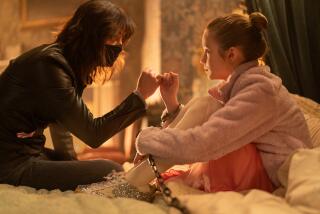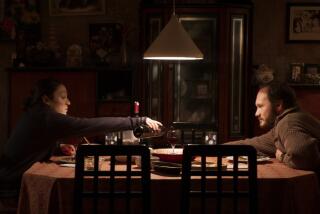Movie review: ‘Nothing Personal’
Everything is personal in the haunting solitude of “Nothing Personal,” starring Stephen Rea and Lotte Verbeek in this most unlikely of love stories.
Polish writer-director Urszula Antoniak’s impressive feature film debut begins and ends in near silence, broken only by distant ambient sounds. Between those bookends, the filmmaker tests the power, and the limits, of sight and sound, rather than words, to tell a story. Beautifully evocative camera work by Daniel Bouquet sets the tone as we follow Verbeek’s copper-haired beauty from her start in Holland, to the green rolling sweep and rocky desolation of Ireland’s Connemara region, and finally to Spain.
The silence itself is a bold stroke — the eerie eye of the hurricane in the Facebook storm, where the private is increasingly made public. It’s as if we’ve forgotten the power of measured and calculated quiet, or how unsettling its presence can be, a sensation Antoniak understands and exploits.
The film opens as a young woman sits in an apartment, looking below as strangers pick through boxes filled with the contents of what must have been her life. She is troubled, she has been hurt. The apartment feels painfully empty, light playing through curtain-less windows and across an expanse of worn wooden floors. Suddenly there is a car zooming down an empty highway along the Irish coast. There is no explanation for any of it.
What starts to happen as she hitches rides or, more often than not, strides alone down the narrow highways that snake through the Irish countryside, is that you begin to fill in all those blanks the filmmaker has left. When words do come, they are few and often prickly.
The girl avoids the human race, but one day she slips into an isolated cottage on a promontory overlooking a wild Irish sea. The house turns out to be inhabited by a man (Rea), who is nearly as solitary as she so it’s a wonder that they ever move past their first encounter.
Thematically, the filmmaker is playing around with how we figure out the strangers in our midst. Verbeek’s alienated enigma is like a feral animal who worries that even coming inside for a meal is too much of an emotional risk. After Rea’s Martin understands that, he begins leaving plates of the gourmet dishes he cooks up, on the bench outside. Understanding comes in how they relate to each other over time. In a subversive way, the film examines the distinction between what we need to know about someone versus what we want to know.
What little concrete help the filmmaker does offer in framing the story of the girl and the guy comes on black-and-white title cards periodically dropped in like chapter titles. Sometimes it’s just a word — “Loneliness,” other times a phrase — “The End of a Relationship.” Always it proves to be less a definition than a vague hint of how to think about what is coming next.
That the film works as well as it does with such bare exposition rests on fine performances from relative newcomer Verbeek, who’s primarily done TV work around Europe, and the veteran Rea, who has no trouble finding either Martin’s loner or slightly bemused intellectual sides, having done his share of both over a long career. Verbeek turns out to have an easy facility for creating a rich interior life. Whether it’s the slight edge of worry that flashes in her eyes or the way in which she uses her body to embrace and resist Martin and his world, a feeling for who she is and why begins to take shape.
Their relationship, for it is something of a love story, develops in uneven fits and starts as two people who don’t want to need each other find that they do. As for the many loose ends the director leaves, you can either tie them or leave them loose, either way is fine since the experience as much as anything is what Antoniak was after.
More to Read
The biggest entertainment stories
Get our big stories about Hollywood, film, television, music, arts, culture and more right in your inbox as soon as they publish.
You may occasionally receive promotional content from the Los Angeles Times.







